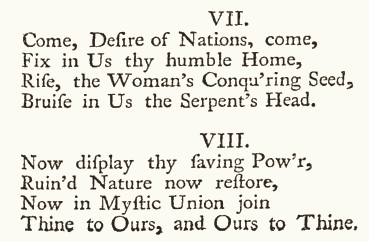“Mystic Union” (Greatest Christmas Song II)
One of the changes that Hark the Herald Angels Sing has undergone is that it now has a chorus, and the stanzas have been combined into pairs. Originally, four lines were sung, and that was one stanza, or verse. Now we sing eight lines, and then we sing “Hark the Herald Angels Sing, Glory to the Newborn King” as a chorus.

We’re now getting into verses, or combinations of verses, that are virtually unknown. Here’s the next part of our song:
Come, Desire of nations, come,
Fix in us Thy humble home;
Rise, the woman’s conqu’ring Seed,
Bruise in us the serpent’s head.
Now display Thy saving power,
Ruined nature now restore;
Now in mystic union join
Thine to ours, and ours to Thine.
These triumphant words are deep with meaning. “Desire of Nations” is a phrase also used in another one of my personal favourites, O Come O Come Emmanuel:
O come, Desire of nations, bind
In one the hearts of all mankind;
Bid Thou our sad divisions cease,
And be Thyself our King of Peace.
The phrase is from the AV (KJV) translation of Haggai 2:7 (see AV here). Interestingly, this is a disputed translation. Some people believe the verse speaks of the Messiah, others do not. But the idea is certainly valid – that Jesus is the Messiah that nations have long looked for. Come at last, Lord! And yet, this part of the song does not speak of the first or second coming of Christ. It speaks of our desire that Christ should come and save us personally.
“The woman’s conquering seed” is Jesus, a descendant of Eve and born of a virgin, Jesus comes to finally destroy the power of the devil. For more detail on this prophecy from Genesis 3:15, see this edition of Promises of a Messiah. Don’t just bruise the serpent’s head in general – we want this to be a reality in us, says this song. “Now, display thy saving power!”
The last part of this stanza continues the idea of the deepest need of humans throughout history. We were created as something “very good”, a perfect creation of God (Genesis 1:26-31). But when the first man and woman decided to rebel against God, that perfect human nature was ruined.
A look at the world confirms it – we are in an unstoppable drift toward selfishness, a hatred of God, confusion and destruction. We look for new laws, or social pressure, psychology, public shaming, even violence – to try to stop people from doing things that we feel are wrong or destructive. But although sometimes these things can restrain evil for a time, or at least cause people to move away from less socially acceptable evil, the problem remains. A ruined nature.
So what is the answer that Charles Wesley suggests in this carol? “Now in mystic union join Thine to ours, and ours to Thine”. That is, to join human nature with God’s nature.
This can be confusing and misunderstood. The idea is not that a sinful nature can be mixed with God’s perfect nature. That would be impossible. No, it’s not the sinful nature, but it’s a person who is transformed by their union to Christ.
It is the Person who was born in Bethlehem who finally reversed the curse by living a perfect life. And then He took away His people’s sin by taking their punishment on the cross.
Paul explains it more clearly. All descendants of Adam are “in Adam”. They share in Adam’s sinful nature. Everyone in Adam is a sinner, by nature and by choice.
But now there is a “new Adam”, a new “First Man”. This time, He did not yield to Satan’s temptation. He lived a perfect life, and died a substitutionary death.
But there’s a problem – we’re all still “in Adam” – under a curse. The only hope is that we join with Christ. And so, by his grace, and through faith, Christians become members of a new race – those “in Christ”. In Christ we are descendants of the Perfect Man. We are forgiven of sin, and credited Christ’s perfect obedience. Simply stated:
For as by a man came death, by a man has come also the resurrection of the dead. For as in Adam all die, so also in Christ shall all be made alive.
1 Corinthians 15:21-22
This amazing theme will be further explained next week, in one more verse that evolved through time. But let’s finish with part of another early hymn from the Wesleys:
The Promise stands forever sure
Hymns and Sacred Poems (John and Charles Wesley) (Scripture verses added)
And we shall in Thine Image shine (Romans 8:29)
Partakers of a nature pure (2 Peter 1:3-4)
Holy and Perfect and Divine
In Spirit join’d to Thee the Son
As Thou art with Thy Father One (John 17:20-23)

11 December 2019 @ 10:42 am
Very excited to have found, and now, follow your blog – I am Andrew Cottrill (son of Dave, grandson of Jack/John who was included in a memorial post on this blog). I’m a pastor in Saskatchewan and so we have similar interests!
All the best,
Andrew
13 December 2019 @ 7:36 pm
No kidding – son of Dave and Judy? So we would be second cousins. We most definitely should be in touch. 🙂
The Greatest Christmas Song II (index) – Finding direction
26 December 2019 @ 6:01 pm
[…] “Mystic Union” […]